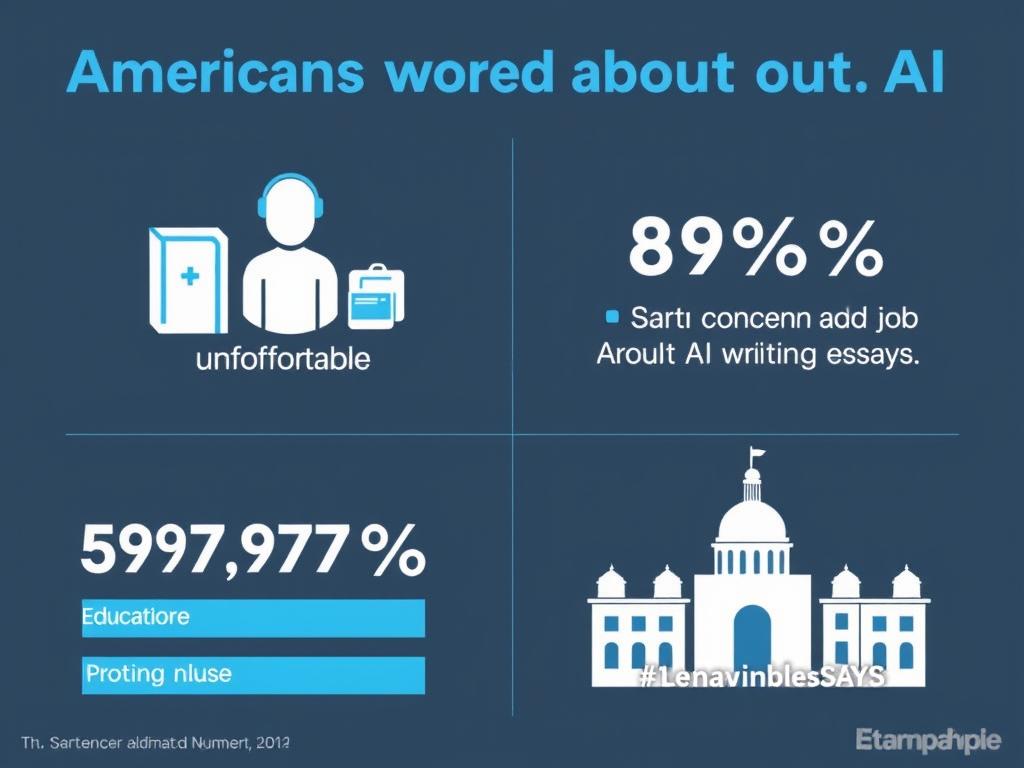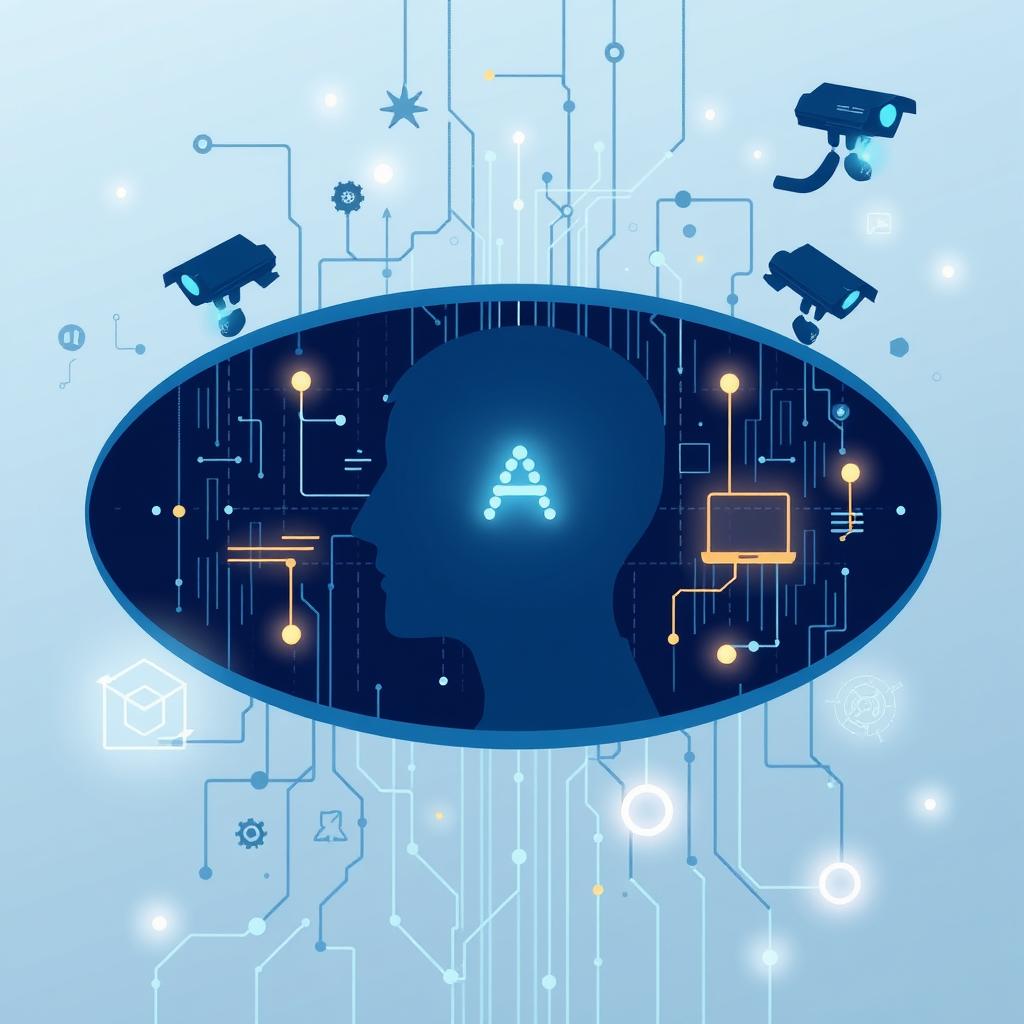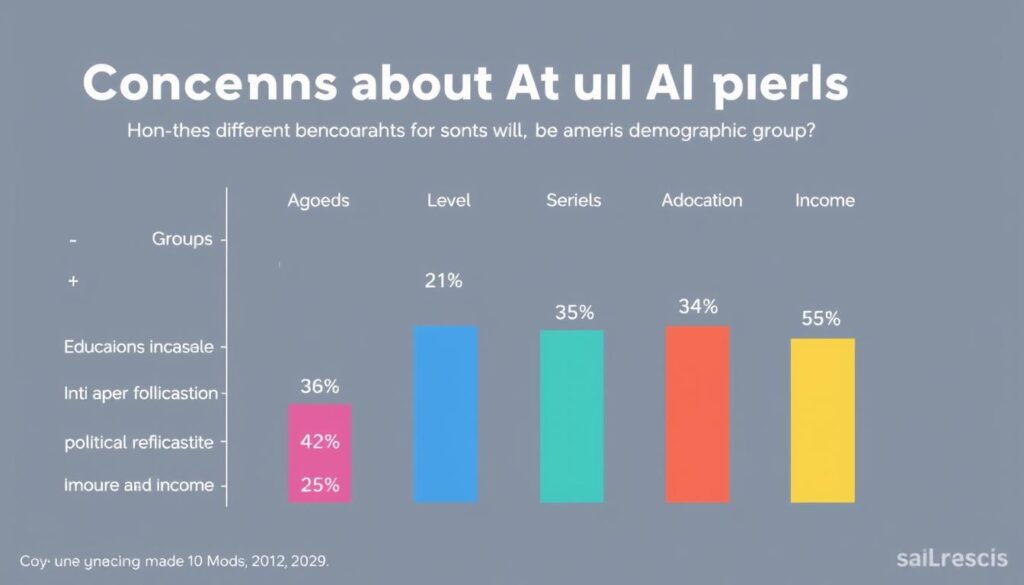Artificial intelligence has rapidly evolved from a sci-fi concept to an everyday reality that shapes how we work, communicate, and live. Yet as AI becomes more integrated into American society, public anxiety is growing. Recent surveys reveal a significant shift in how Americans perceive AI—from cautious optimism to increasing concern. This article explores the data behind this trend, unpacks the specific worries driving public opinion, and examines how various stakeholders are responding to these concerns.
The Growing Tide of AI Anxiety: What the Data Shows
Public concern about AI has increased significantly since 2022
According to recent Pew Research Center data, 52% of Americans now report being more concerned than excited about AI in daily life, compared to just 10% who express more excitement than concern. The remaining 36% feel a mix of both emotions. This represents a notable shift in public sentiment compared to previous years.
The level of concern varies significantly across demographic groups. Adults with college or postgraduate degrees show greater familiarity with AI technologies but not necessarily less concern. Gender and age also play important roles, with men and younger adults demonstrating more familiarity with AI concepts than women and older Americans.
When it comes to specific AI applications, Americans show varying levels of comfort. For instance, 65% would support AI use in skin cancer screening, while 60% would feel uncomfortable with healthcare providers relying on AI for general care. This suggests that context matters significantly in shaping public opinion.

A 2024 survey conducted by Public First in partnership with the Center for Data Innovation found Americans closely split on whether AI will make things better or worse for their personal lives. While 32% believe AI will improve their situation, 22% expect it to make things worse, and 33% anticipate no significant impact.
What’s Keeping Americans Up at Night: Key AI Concerns
Job Displacement and Economic Impact
Employment concerns top the list of public anxieties about AI. According to survey data, 59% of Americans believe AI will likely increase unemployment, while only 7% think it might increase wages. Interestingly, workers with higher education levels express slightly more concern about AI potentially replacing their jobs within the next two decades.
A February 2025 Pew Research Center report found that about one-third of workers (32%) believe AI use will lead to fewer job opportunities for them in the long run. Only 6% anticipate more opportunities, while 31% expect no significant difference.

Privacy and Data Security
Americans express significant concern about how AI systems collect, use, and potentially misuse personal data. Large majorities believe that as companies implement AI, personal information will be used in ways that make people uncomfortable or that weren’t originally intended.
The surveillance capabilities of AI technologies particularly worry the public. Facial recognition systems, predictive algorithms, and data mining practices have all contributed to a sense that privacy is increasingly at risk in an AI-powered world.

Loss of Human Connection
Many Americans worry about AI diminishing human relationships and interactions. In healthcare settings, a majority believe increased AI reliance would harm patient-provider relationships. Similarly, in workplace contexts, many cite the loss of the “human factor” as a primary concern with AI-driven hiring processes.
This concern extends to education, where 57% of teens surveyed believe it’s unacceptable to use AI tools like ChatGPT to write essays, suggesting a value placed on authentic human expression and learning.
Misinformation and Election Integrity
With the rise of sophisticated AI content generation tools, 71% of Americans fear AI-generated content could manipulate elections. This concern is shared almost equally among Democrats and Republicans, making it one of the few areas of bipartisan agreement regarding AI risks.
Nearly half (46%) of Americans lack confidence in their ability to detect fake AI-generated content, highlighting the challenge of maintaining information integrity in an era of increasingly convincing synthetic media.

AI concerns vary significantly across demographic groups
Addressing Public Concerns: Government and Corporate Responses
As public anxiety grows, both government entities and private companies are taking steps to address AI concerns. The White House has issued executive orders on AI safety and ethics, while Congress continues to debate comprehensive AI regulation frameworks.

Policymakers are increasingly focused on AI governance frameworks
Public support for regulation is strong, with 67% of Americans familiar with AI chatbots expressing concern that the government won’t go far enough in regulating their use. Only 31% worry about excessive regulation. Similarly, 87% want AI-powered autonomous vehicles held to higher testing standards than conventional vehicles.
Major tech companies have responded by establishing AI ethics boards, publishing transparency reports, and developing technical safeguards. However, critics argue these self-regulatory efforts are insufficient without meaningful government oversight.
“The challenge that policymakers now face is perfectly encapsulated in the fact that the public currently opposes more government funding for AI research, which is at the top of the policy agenda that the Bipartisan Senate AI Working Group has just released.”
In healthcare, where AI applications show particular promise but also raise concerns, 75% of Americans think providers will move too quickly in adopting AI before fully understanding potential risks. This suggests a desire for careful, measured implementation rather than rapid deployment.
The Silver Lining: Potential Benefits and Positive Applications

Despite widespread concerns, Americans do recognize potential benefits of AI in specific contexts. A majority (57%) express excitement about AI performing household chores, valuing its ability to handle routine tasks and save time.
In healthcare, 65% would welcome AI assistance for skin cancer screening, acknowledging the technology’s potential accuracy in medical diagnostics. Studies have indeed found some AI software to be highly effective at detecting skin cancer.
Reducing Bias and Improving Fairness
Interestingly, many Americans are optimistic about AI’s potential to reduce bias in certain contexts. Among those who see racial and ethnic bias as problems in healthcare, 51% believe AI would improve the situation (versus 15% who think it would worsen it). Similarly, 53% of those concerned about hiring bias think AI could help reduce discrimination based on race or ethnicity.
Workplace Efficiency and Innovation
Among workers who have used AI chatbots, 40% report these tools have been extremely or very helpful in allowing them to complete tasks more quickly. While a smaller percentage (29%) find them equally helpful for improving work quality, this still represents a significant positive impact for many professionals.
Industries like information technology, banking, finance, and insurance show the most optimism about AI creating new job opportunities rather than eliminating existing ones.

Many Americans are finding value in specific AI applications
Real-World Examples: AI Controversies and Successes
Facial Recognition Lawsuits
Several major tech companies have faced lawsuits over their facial recognition technologies. These cases highlight public concern about consent, privacy, and potential misuse of biometric data. The outcomes of these legal challenges are helping to shape both corporate practices and public policy regarding AI deployment.
Deepfake Incidents
Recent incidents involving deepfake videos of political figures and celebrities have intensified concerns about AI-generated misinformation. These cases demonstrate the potential for synthetic media to undermine trust in visual evidence and manipulate public opinion, particularly during election cycles.

Deepfakes present growing challenges for information integrity
AI in Cancer Detection
Several healthcare systems have successfully implemented AI tools for cancer screening, with some studies showing AI outperforming human radiologists in detecting certain types of cancer. These success stories illustrate the life-saving potential of AI when properly developed and deployed.
Autonomous Vehicle Testing
The ongoing development and testing of self-driving cars has sparked both excitement and concern. While 83% of Americans believe autonomous vehicles will lead to job losses for drivers, many also recognize potential benefits in safety and accessibility.
Staying Informed: How to Engage with AI Policy Debates
As AI continues to evolve and shape society, staying informed and engaged is crucial. Here are several ways Americans can participate in the ongoing conversation about AI governance:

Public participation in AI governance discussions is essential
Understanding the basics of how AI works can help demystify the technology and enable more informed opinions. While only 30% of U.S. adults correctly recognize all examples of AI in everyday life, this knowledge gap represents an opportunity for education and engagement.
Conclusion: Navigating the AI Future Together
The data clearly shows that Americans worried about AI have legitimate concerns that deserve attention. From job security to privacy, from election integrity to human connection, these anxieties reflect real challenges that accompany technological transformation.
Yet the research also reveals nuance in public opinion. Americans’ views depend greatly on specific applications and contexts. They show enthusiasm for AI that assists with routine tasks, improves healthcare outcomes, or reduces bias—while expressing caution about applications that might threaten jobs, privacy, or authentic human interaction.
As AI continues to evolve, finding the right balance between innovation and responsible governance will require ongoing dialogue between technologists, policymakers, and the public. By staying informed and engaged, Americans can help shape an AI future that reflects their values and addresses their concerns.
Stay Informed About AI Developments
Subscribe to our newsletter for the latest research, policy updates, and practical guidance on navigating the AI landscape. Join thousands of informed citizens helping to shape responsible AI governance.
Download Our Free Guide
Get our comprehensive “Understanding AI Policy: A Citizen’s Guide” to learn how artificial intelligence is being regulated and how you can participate in the conversation.







